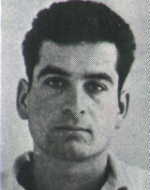Son of-Dan and Yehudit. Born on November 2, 1945 in Hanita, he studied at the elementary school in Hanita and in the kibbutz regional high school on the scale of Tzur. Since he was a young boy, he had loved going on school trips and taking part in children’s games. As he grew older he began to follow the way birds lived. Stubbornly and patiently he would lurk and watch them for hours to photograph them in their natural surroundings. His final work in eighth grade and his tenth grade thesis focused on the bird (the stiletto) and were based on research, ability to observe and deep knowledge. About a year before his enlistment, he contracted a disease that was not identified in time. Because of which his recruitment was postponed and his ability to serve in the combat force was questioned. During his illness, he would find an outlet in the painting. Because of his illness, he began to lag behind in his studies, but when he recovered he made a stubborn effort, achieved his academic backwardness and graduated as one of the outstanding students in the class. At the same time he threw himself into action, aimed at advancing his chances of becoming a combat soldier in the Israel Defense Forces, and was constantly engaged in intensive physical training and worked tirelessly in various kinds of sports, especially in the field of volleyball. Hanita’s volleyball team, which began its first steps in the national league, gathered a young team around it and encouraged it, so that within three years it reached the Israeli National Volleyball League, where Udi was drafted into the IDF in November 1964. His group and every opportunity would come home for training and games, despite his fatigue and smell F. But he did so without offending his role and tasks. When he enlisted, he was accepted into a combat unit and completed the officers’ course as an outstanding trainee. In his unit, in which he devotedly fulfilled training and command roles and took part in its operations, he attained the rank of captain. Although he took an interest in all the challenges and tasks of his unit, he nonetheless saw himself as an active participant in Hanita. He attended meetings of friends and maintained close contact with his kibbutz. He was going to marry him and set up his home on the kibbutz. On the 20th of Av, 5729 (20.7.1969), Ehud fell in battle on the island of Green in the Gulf of Suez area and was brought to rest in the Hanita cemetery, and the day after his fall, Defense Minister Moshe Dayan eulogized Ehud and his friends, These sons, who live this way, that way fighters and so die are the most wonderful thing we have in our lives – in our lives as parents, as friends and in the life of Israel as a nation. There are simple events, which over the years become legendary generations. These children are a legend that was a reality, a dream of a people, an exile, a dream and a humiliation – a dream of reality – a reality of independence, of the homeland, of Jerusalem, of settling the mountain and desert, of water and of trees and flowers – , Of funerals, of bullet-riddled bodies returning to us at dawn, carried on stretchers, and all we have left is to embrace them to our hearts, to embrace them with unbearable pain, with love without words and with knowledge that we have nothing closer to them, “The minister ended his eulogy:” The parents of the sons who fell in the war! Not to console, but to be with you in mourning, we are here, to be in this mourning together with all our Lev and soul. “The Hanita Group published a booklet entitled” Udi “in his memory.
